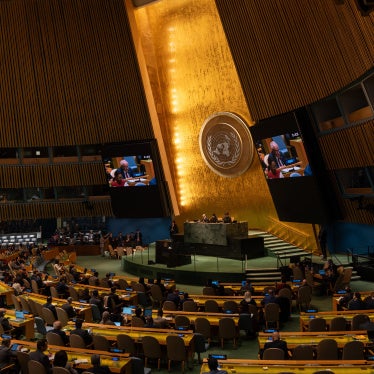Objective
The Commission on Human Rights should adopt a resolution affirming that human rights cannot be denied on the basis of sexual orientation or gender identity. Such a resolution is important not only to shed light on violations that are often shrouded in stigma and silence — but also to uphold the principle that all human rights must be enjoyed equally by all people.
Background
At the 59th session of the Commission on Human Rights, Brazil introduced a resolution on “Human Rights and Sexual Orientation.” Affirming the inadmissibility of discrimination as a fundamental principle, the resolution expressed “deep concern at the occurrence of violations of human rights all over the world against persons on the grounds of their sexual orientation.” Consideration of the resolution was postponed by a narrow vote until the 60th session of the Commission.Human Rights Watch and others have documented widespread and egregious abuses on the basis of sexual orientation and gender identity. United Nations human rights mechanisms have also drawn attention to such abuses. Most notably, the Human Rights Committee has determined that protections against discrimination in the International Covenant on Civil and Political Rights (ICCPR) should be understood to include “sexual orientation” as a protected status.
“Sexual orientation” refers to the way in which a person’s sexual and emotional desires are directed. “Gender identity” refers to a person’s deeply felt, internal sense of belonging to a gender. Both are profoundly rooted, fundamental aspects of the human personality.
Despite this fact, persecution and discrimination based on sexual orientation or gender identity are widespread around the world. Almost one hundred countries still legally prohibit sexual relations between persons of the same sex. In other countries, vaguely-worded and sweeping laws against “public scandals” or “indecent behavior” are used to penalize people whose only crime is looking, dressing, or behaving differently from rigidly enforced social norms. In many countries, people detained on the basis of their sexual orientation or gender identity are tortured and ill-treated in police custody. Many people face violence in the community or family because of their sexual orientation or gender identity. Many state officials, driven by prejudice, refuse to protect them.
The resolution’s condemnation of such abuses is clearly grounded in human rights standards and United Nations precedents. In its landmark 1994 decision in the case of Toonen v Australia, the U.N. Human Rights Committee held that “sexual orientation” should be understood to be a status protected against discrimination under articles 2 and 26 of the ICCPR. The Human Rights Committee has continued to be concerned with sexual-orientation-based discrimination in its comments to a number of countries.
Resolutions of the Commission on Human Rights have also addressed human rights violations based on sexual orientation. In 2003, the Commission’s resolution on extrajudicial, summary, or arbitrary executions (Resolution 2003/53) called upon “States concerned to investigate promptly and thoroughly … all killings committed for any discriminatory reason, including sexual orientation.” In her 1999 report, The Special Rapporteur on extrajudicial, summary, or arbitrary executions noted that “criminalizing matters of sexual orientation increases the social stigmatization of members of sexual minorities, which in turn makes them more vulnerable to violence and human rights abuses, including violations of the right to life. Because of this stigmatization, violent acts directed against persons belonging to sexual minorities are also more likely to be committed in a climate of impunity.”
Similarly, in his 2001 report to the General Assembly, the Special Rapporteur on torture stated that “members of sexual minorities are disproportionately subjected to torture and other forms of ill-treatment, because they fail to conform to socially constructed gender expectations. Indeed, discrimination on the grounds of sexual orientation may often contribute to the process of dehumanization of the victim, which is often a necessary condition for torture and ill-treatment to take place.”
The Special Representative of the U.N. Secretary General on Human Rights Defenders also noted in her 2001 report the “special importance” of “human rights groups and those who are active on issues of sexuality, especially sexual orientation. … These groups are often very vulnerable to prejudice, to marginalization and to public repudiation, not only by state forces but other social actors.”
The U.N. Working Group on Arbitrary Detention also affirmed that the detention of people solely on the basis of their sexual orientation violates fundamental human rights even when the laws under which they are detained do not expressly refer to homosexual conduct.
Finally, at the domestic level, numerous countries have institutionalized protections against discrimination based on sexual orientation or gender identity, both through jurisprudence and through legislation. In 1996, post-apartheid South Africa became the first country to bar discrimination based on sexual orientation in its Constitution.
Recommendations
The Commission on Human Rights should adopt a resolution that:
- Affirms the principle of the inadmissibility of discrimination on any grounds.
- Expresses concern at the occurrence of discrimination and violations of human rights based on persons’ sexual orientation or gender identity.
- Stresses that the enjoyment of human rights and fundamental freedoms should not be hindered on the grounds of sexual orientation or gender identity.
- Calls upon States to promote and protect the rights of all persons regardless of their sexual orientation and gender identity.
- Encourages all special procedures of the Commission on Human Rights, as well as the treaty bodies, to give due attention within their mandates to human rights violations based on sexual orientation and gender identity.
- Requests the United Nations High Commissioner for Human Rights to pay due attention to such violations, and to present a report on this issue to the 61st session of the Commission on Human Rights.







